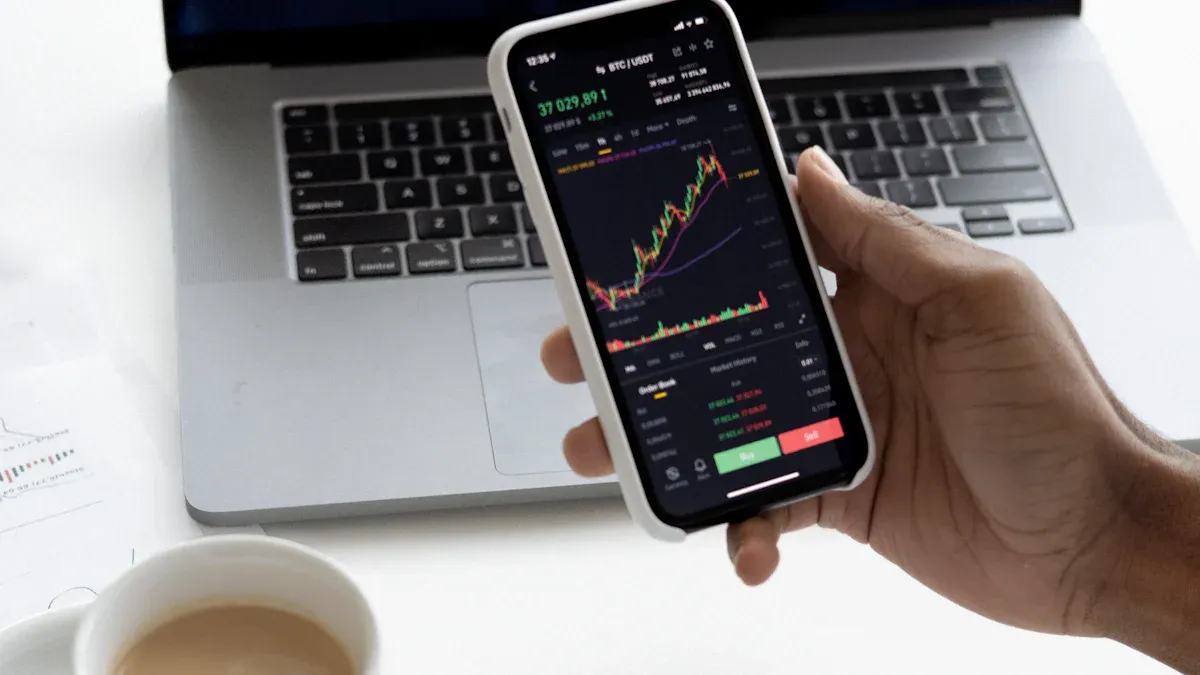- EasyCard
- Trade
- Help
- Announcement
- Academy
- SWIFT Code
- Iban Number
- Referral
- Customer Service
- Blog
- Creator
In-Depth Comparison of U.S. Stock Trading Fees and Tools: Tiger Brokers vs. Charles Schwab

Image Source: pexels
If you want to enter the U.S. stock market at a low cost, Tiger Brokers will attract you. If you value U.S. stock trading fees and Chinese-language services, Tiger Brokers supports multiple deposit methods and has a user-friendly interface. If you prioritize powerful research tools and global investing, Charles Schwab is more suitable for you. If you prefer a wide range of investment products, Charles Schwab offers more U.S. stocks, ETFs, and wealth management options. If you focus on service experience and international compliance, Charles Schwab can also meet your needs.
Key Points
- Tiger Brokers offers low commissions and Chinese-language services, suitable for beginners and investors who prefer convenient mobile operations.
- Charles Schwab provides commission-free trading and rich professional tools, ideal for professional investors seeking in-depth research and diverse products.
- Both platforms have no account management fees, but deposit/withdrawal and currency conversion fees vary, requiring careful comparison to avoid hidden costs.
- Tiger Brokers excels in mobile experience with fast Chinese customer support; Charles Schwab’s desktop platform is robust, with services primarily in English.
- When choosing a broker, consider your investment goals, language needs, and trading habits, rationally comparing fees and services to make the best decision for yourself.
U.S. Stock Trading Fees

Image Source: pexels
Commissions and Platform Fees
When choosing a U.S. stock broker, commissions and platform fees are the most direct costs. Tiger Brokers emphasizes low commissions, with regular U.S. stock trades costing approximately $0.005 per share, with a minimum of $1.99 per trade. You won’t be charged monthly platform fees or minimum account balance fees. Charles Schwab offers commission-free U.S. stock trading, meaning you pay no commissions for trading U.S. stocks and most ETFs. You also don’t need to worry about platform monthly fees. Both platforms do not charge for real-time market data, which can save you a significant expense.
Tip: When you see “commission-free” offers, note that brokers may charge fees through other means, such as spreads or order flow revenue.
Deposit and Withdrawal Fees
When depositing or withdrawing funds with Tiger Brokers, you can choose Hong Kong bank wire transfers or third-party payment methods. Deposits are typically free, but withdrawals incur a $25 fee per transaction from Tiger Brokers. You also need to bear Hong Kong bank wire transfer fees, usually $15–$30 per transaction. Charles Schwab supports free ACH transfers for U.S. domestic accounts, but if you use international wire transfers for deposits, banks may charge approximately $25–$50 per transaction. Charles Schwab itself does not charge withdrawal fees, but you need to account for wire transfer fees from Hong Kong or other banks.
| Platform | Deposit Fees | Withdrawal Fees | Notes |
|---|---|---|---|
| Tiger Brokers | Free | $25 per transaction | Additional Hong Kong bank wire fees apply |
| Charles Schwab | ACH free / Wire transfer fees apply | Platform free | Bank wire fees approximately $25–$50 per transaction |
Options and ETF Fees
If you enjoy trading U.S. stock options, Tiger Brokers charges $0.65 per contract, with a minimum of $2.5 per trade. Charles Schwab also charges $0.65 per options contract, with no minimum trade fee. When trading ETFs, Tiger Brokers charges standard U.S. stock rates, while Charles Schwab offers commission-free trading for most ETFs. You can calculate actual U.S. stock trading fees based on your trading frequency and product choices.
Hidden and Regulatory Fees
When trading U.S. stocks, you also need to consider hidden fees. Both Tiger Brokers and Charles Schwab collect U.S. regulatory fees on behalf of clients, such as the Trading Activity Fee (TAF) and FINRA fees. These fees are typically minimal, costing a few cents per trade. You should also note commission-free services. Tiger Brokers offers commission-free services for Chinese users, which may involve additional service fees. Charles Schwab does not provide commission-free services. Neither platform charges account management fees, but if your account remains inactive for a long time, some platforms may impose minimum consumption thresholds. You should carefully review the platform’s fee details to avoid increasing overall U.S. stock trading fees due to overlooked small charges.
Note: Some platforms advertise “commission-free” trading but may charge fees for currency conversion, stock transfers, or dividend collection. You should focus on total costs, not just surface fees.
Platform Tools

Image Source: pexels
Operational Experience
When choosing a broker, operational experience directly affects your trading efficiency. Tiger Brokers’ mobile app is designed to be simple and clear, making it easy for you to get started quickly. Multiple industry experts believe that Tiger Brokers excels in mobile experience and user journey design, particularly meeting the needs of younger users for convenient operations. You can easily complete account opening, deposits, and trading operations. Charles Schwab’s interface caters more to professional investors, with a rich functional layout, but you may need time to adapt during initial use. If you prioritize ultimate convenience and Chinese-language services, Tiger Brokers will feel more comfortable for you.
Tip: A good user experience isn’t just about an attractive interface; it also includes service usability and product variety. With Tiger Brokers, you can enjoy a friendlier experience for beginners.
| Trading Platform | Mobile App Experience | User Interface Friendliness | Customer Service Language Support | Suitable Investor Type |
|---|---|---|---|---|
| Tiger Brokers | Top-tier | Friendly, suitable for beginners | Chinese support, top-tier | Beginners and younger investors |
| Charles Schwab | Excellent | Professional but slightly complex | Primarily English support | Professional investors |
Functional Richness
With Tiger Brokers, you can use a variety of basic trading tools, including U.S. stocks, Hong Kong stocks, A-shares, ETFs, and options. The platform also provides real-time market data, simple charts, and basic research reports to meet daily investment needs. Charles Schwab offers a more comprehensive range of investment products and research tools. You can access a wide variety of U.S. stocks, ETFs, bonds, and mutual funds, along with professional-grade analytical tools and in-depth research reports. If you value portfolio diversity and in-depth research, Charles Schwab is more suitable for you.
When choosing a platform, weigh functional richness based on your investment goals and research needs. Tiger Brokers suits users seeking convenience and basic functionality, while Charles Schwab meets your needs for professional tools and diverse products.
Mobile and Desktop Platforms
If you prefer trading on your phone, Tiger Brokers’ mobile experience will feel smooth and efficient. The platform supports multiple languages, especially Chinese services, making it convenient for you to manage your account anytime, anywhere. Charles Schwab’s mobile platform performs excellently but leans toward professional users, with some features requiring desktop access. On the desktop, you can experience Charles Schwab’s more robust research and analytical tools, suitable for in-depth investment decisions.
- Tiger Brokers: Top-tier mobile experience, suitable for beginners and high-frequency trading.
- Charles Schwab: Comprehensive desktop functionality, ideal for professional investing and in-depth analysis.
You can choose the platform tools that best suit your trading habits and device preferences.
Customer Service
Chinese-Language Support
When choosing a U.S. stock broker, Chinese-language support is crucial. Tiger Brokers provides comprehensive Chinese-language services. You can communicate in Chinese via the app, website, customer service hotline, and email. When you encounter issues, customer service will respond in Chinese. Charles Schwab primarily operates in English, with only some pages and documents offering Chinese translations. If you prefer communicating in Chinese, Tiger Brokers will feel more convenient and reassuring.
Tip: Chinese customer service can significantly improve your communication efficiency during account opening, transfers, or technical issues.
Response Speed
When you face account or trading issues, response speed directly impacts your experience. Tiger Brokers’ customer service supports online chat and phone, typically responding within a few minutes. You can get help quickly even during peak times. Charles Schwab’s customer service relies on phone and email, with fast English responses but limited Chinese support. If you need urgent issue resolution, Tiger Brokers’ instant online customer service is more suitable for you.
| Broker | Customer Service Channels | Response Speed | Language Support |
|---|---|---|---|
| Tiger Brokers | Online, phone, email | Fast (within minutes) | Chinese, English |
| Charles Schwab | Phone, email | Relatively fast (may require waiting) | Primarily English |
Educational Resources
When you want to improve your investment skills, educational resources are key. Tiger Brokers provides Chinese-language educational content, including beginner guides, market analysis, video courses, and online webinars. You can access learning materials anytime via the app or website. Charles Schwab offers extensive English-language educational resources covering investment basics, market trends, and wealth planning. If you have strong English skills, you can access deeper learning materials. If you rely on Chinese content, Tiger Brokers’ educational resources better suit your needs.
You can choose the broker’s educational platform based on your language preferences and learning goals.
Suitable Audiences
Beginner Investors
If you’re new to U.S. stock investing, Tiger Brokers will make it easier for you to get started. The platform has a user-friendly interface, supports Chinese, and offers a smooth mobile experience. You can quickly open an account, deposit funds, and trade via the app. While Charles Schwab is feature-rich, its primarily English services may require some adaptation for beginners. When choosing, pay attention to options fees, margin rates, and hidden costs. Tiger Brokers has higher options fees but lower margin rates, suitable for when you need margin financing. Charles Schwab has moderate options fees and higher margin rates, better for when you don’t frequently use margin.
Be mindful of inactivity fees, data subscription fees, and withdrawal fees to avoid unnecessary expenses.
| Consideration | Tiger Brokers | Charles Schwab |
|---|---|---|
| Language Support | Chinese, suitable for beginners | Primarily English, limited Chinese |
| Options Fees | Higher | Moderate |
| Margin Rates | Lower | Higher |
| Customer Service | Chinese support, fast response | English support, excellent service |
Professional Investors
If you seek a professional trading experience, Charles Schwab’s research tools and product offerings are more robust. The platform supports a wide range of investment products and comprehensive research resources, ideal for in-depth analysis. Tiger Brokers excels in mobile experience and lower trading costs, suitable for efficiency and cost-conscious trading. If you need complex trading strategies, Charles Schwab’s desktop platform is more powerful. Tiger Brokers is better for high-frequency trading and mobile operations.
- If you value research and diverse products, choose Charles Schwab.
- If you prioritize Chinese services and mobile experience, choose Tiger Brokers.
Long-Term Investors
If you prefer long-term holding of U.S. stocks or ETFs, Charles Schwab’s commission-free trading and diverse wealth management products are more suitable. You can enjoy low-cost investing and diversified asset allocation. Tiger Brokers also supports long-term investing with no account management fees, suitable for low-frequency trading. Pay attention to hidden fees like currency conversion and transfer fees to maximize long-term returns.
International Users
If you’re in China or other regions, Tiger Brokers offers convenient deposit methods and full Chinese-language services. You can easily transfer funds via Hong Kong bank wire transfers. Charles Schwab supports international account opening but primarily offers English services. When choosing, consider language support, deposit/withdrawal convenience, and localized services. Tiger Brokers is better for those needing Chinese support and flexible deposit channels.
Hidden Costs
Account Management Fees
When choosing a broker, you often overlook account management fees. Currently, neither Tiger Brokers nor Charles Schwab charges account management fees. You don’t need to worry about fees for low account balances. However, if your account remains inactive for a long time, some platforms may impose minimum consumption thresholds. You should regularly check account activity to avoid extra fees due to low trading frequency. Some platforms may also charge data subscription or account dormancy fees. Review the fee structure carefully before opening an account to ensure small operations don’t increase U.S. stock trading fees.
Currency Conversion and Transfer Fees
When trading U.S. stocks, currency conversion fees are an easily overlooked cost. Tiger Brokers supports multi-currency deposits, but when converting RMB or HKD to USD, the platform charges a percentage-based conversion fee based on real-time exchange rates. Charles Schwab also charges fees for currency conversion. You should note the difference between the platform’s quoted rates and actual bank rates. Transfer fees are another hidden cost. Transferring stocks from Tiger Brokers to Charles Schwab, or vice versa, typically costs $50–$100 per transfer. Some platforms may also charge small service fees for dividend collection.
Common Pitfalls
When you see “commission-free” promotions, you may overlook other fee items. Many platforms, while waiving U.S. stock trading commissions, charge fees for currency conversion, stock transfers, withdrawals, or commission-free services. Note that Tiger Brokers offers commission-free services for Chinese users, which may involve additional fees. When choosing a broker, don’t focus solely on surface fees; consider all cost components. Create a fee checklist to compare U.S. stock trading fees across platforms and avoid increased costs due to misunderstandings.
Tip: Before opening an account or trading, thoroughly review the platform’s fee disclosures and consult customer service if anything is unclear.
Selection Recommendations
Decision-Making Process
When choosing a U.S. stock broker, you can follow these steps for a systematic comparison:
- Clarify Investment Needs
You need to first define your investment goals. Are you aiming for frequent trading or long-term holding? Do you need Chinese-language services? Do you frequently need cross-border transfers? These questions directly influence your choice. - Compare U.S. Stock Trading Fees
You can check the detailed fee structures of Tiger Brokers and Charles Schwab on professional review websites. Focus on commissions, platform fees, deposit/withdrawal fees, options and ETF fees, and currency conversion fees. Also, consider hidden costs like transfer fees and account management fees.You can use the 2025 U.S. stock broker in-depth review to obtain the latest fee comparisons and service pros and cons for both platforms.
- Evaluate Platform Features and Service Experience
Compare the trading platform features, operational experience, and customer service of both brokers. Check for Chinese-language support, mobile and desktop usability, and the richness of educational resources. - Review User Feedback and Broker Rankings
Refer to broker rankings and user feedback on authoritative websites to understand the real-world performance of Tiger Brokers and Charles Schwab. You can also access account opening guides to smoothly complete the process. - Make a Choice Based on Your Situation
Consider your fund size, trading frequency, language needs, and service preferences to make a comprehensive decision and choose the broker best suited for you.
User Scenarios
You can quickly identify the right platform based on different investment scenarios:
- Beginner Investors
If you’re new to U.S. stock investing, Tiger Brokers is recommended. You can enjoy a Chinese interface and customer service, simple operations, and a clear account opening process. You can get started quickly, reducing learning costs. - High-Frequency Traders
If you trade U.S. stocks frequently, Tiger Brokers’ low commissions and convenient mobile platform will save you significant costs and time. You can manage your account anytime, anywhere, responding to market changes. - Professional Investors
If you need rich investment products and in-depth research tools, Charles Schwab is more suitable. You can use the professional-grade desktop platform for comprehensive market analysis and portfolio management. - Long-Term Investors
If you prefer long-term holding of U.S. stocks or ETFs, Charles Schwab’s commission-free policy and diverse wealth management products help reduce long-term costs. You can enjoy low fees and quality services. - Chinese and International Users
If you’re in China or other regions, Tiger Brokers offers multiple deposit methods and full Chinese-language services. You can easily transfer funds via Hong Kong bank wire transfers, enjoying localized services. If you have strong English skills, you can also choose Charles Schwab for a global investment platform.
When choosing a broker, don’t rely solely on promotional claims. Systematically compare U.S. stock trading fees, platform features, and service support, and make a rational decision based on your needs.
When choosing between Tiger Brokers and Charles Schwab, you need to focus on differences in U.S. stock trading fees, platform tools, and service experience. You can assess your needs based on age, investment goals, and risk tolerance. Refer to investment community FAQs and beginner guides to rationally compare services and select the broker best suited for you.
FAQ
Are the Account Opening Processes for Tiger Brokers and Charles Schwab Complex?
You can submit documents online via the Tiger Brokers app, completing the application in minutes. Charles Schwab requires filling out English forms and uploading identity documents, with a longer review time. Prepare relevant documents in advance.
How Can You Avoid Currency Conversion Losses in U.S. Stock Trading?
You can convert to USD when exchange rates are favorable. Both Tiger Brokers and Charles Schwab support multi-currency deposits. Pay attention to the difference between platform-quoted rates and actual Hong Kong bank rates.
How Long Does It Take to Withdraw to a Hong Kong Bank?
Withdrawing from Tiger Brokers or Charles Schwab to a Hong Kong bank typically takes 1–3 business days. Note bank processing times and platform review speeds, as holidays may delay funds.
Will You Be Charged Fees for an Inactive Account?
Neither Tiger Brokers nor Charles Schwab charges management fees for inactive accounts. However, regularly log in to avoid service restrictions due to dormancy.
Can You Open Accounts with Both Brokers Simultaneously?
You can open accounts with both Tiger Brokers and Charles Schwab. Allocate funds based on your investment needs. Be mindful of transfer fees and operational processes across platforms.
This article provides a thorough and detailed comparison of Tiger Brokers and Charles Schwab, covering almost every aspect that investors care about, from trading fees and platform tools to customer service. It offers clear advice for different types of investors and reveals easily overlooked hidden costs, such as deposit/withdrawal fees and currency conversion expenses.
However, for most Chinese investors, cross-border fund transfers remain a major pain point. Traditional wire transfer methods, like using a Hong Kong bank, are not only expensive (typically $15-50 per transaction) but also involve complex procedures and long waiting times. This inconvenience significantly hurts the investment experience, especially for those who need to deposit funds quickly to seize market opportunities.
BiyaPay was created to solve these cross-border financial problems. We offer a smoother, lower-cost channel for your investments. We support the conversion between various fiat and digital currencies, allowing you to easily manage global assets, and provide a real-time exchange rate query feature to ensure you always get the best rates. What’s more, our remittance fees are as low as 0.5% with same-day delivery, significantly cutting down your transaction costs and time. Now, you don’t need a complex overseas account to invest in both U.S. and Hong Kong stocks on one platform. Say goodbye to the hassle of cross-border payments and start your efficient financial journey. Register with BiyaPay today to make your fund management as smooth as your trading.
*This article is provided for general information purposes and does not constitute legal, tax or other professional advice from BiyaPay or its subsidiaries and its affiliates, and it is not intended as a substitute for obtaining advice from a financial advisor or any other professional.
We make no representations, warranties or warranties, express or implied, as to the accuracy, completeness or timeliness of the contents of this publication.




Contact Us
Company and Team
BiyaPay Products
Customer Services
is a broker-dealer registered with the U.S. Securities and Exchange Commission (SEC) (No.: 802-127417), member of the Financial Industry Regulatory Authority (FINRA) (CRD: 325027), member of the Securities Investor Protection Corporation (SIPC), and regulated by FINRA and SEC.
registered with the US Financial Crimes Enforcement Network (FinCEN), as a Money Services Business (MSB), registration number: 31000218637349, and regulated by FinCEN.
registered as Financial Service Provider (FSP number: FSP1007221) in New Zealand, and is a member of the Financial Dispute Resolution Scheme, a New Zealand independent dispute resolution service provider.



















